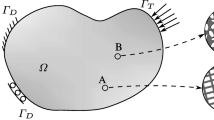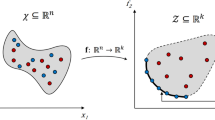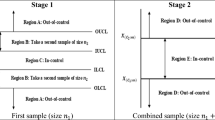Abstract
This paper proposes a methodology for sampling-based design optimization in the presence of interval variables. Assuming that an accurate surrogate model is available, the proposed method first searches the worst combination of interval variables for constraints when only interval variables are present or for probabilistic constraints when both interval and random variables are present. Due to the fact that the worst combination of interval variables for probability of failure does not always coincide with that for a performance function, the proposed method directly uses the probability of failure to obtain the worst combination of interval variables when both interval and random variables are present. To calculate sensitivities of the constraints and probabilistic constraints with respect to interval variables by the sampling-based method, behavior of interval variables at the worst case is defined by the Dirac delta function. Then, Monte Carlo simulation is applied to calculate the constraints and probabilistic constraints with the worst combination of interval variables, and their sensitivities. A merit of using an MCS-based approach in the X-space is that it does not require gradients of performance functions and transformation from X-space to U-space for reliability analysis, thus there is no approximation or restriction in calculating sensitivities of constraints or probabilistic constraints. Numerical results indicate that the proposed method can search the worst case probability of failure with both efficiency and accuracy and that it can perform design optimization with mixture of random and interval variables by utilizing the worst case probability of failure search.







Similar content being viewed by others
References
Acar E, Solanki K (2009) System reliability-based vehicle design for crashworthiness and effects of various uncertainty reduction measures. Struct Multidiscip Optim 39(3):311–325
Adhikari S (2004) Reliability analysis using parabolic failure surface approximation. ASCE J Eng Mech 130(12):1407–1427
Breitung K (1984) Asymptotic approximations for multinormal integrals. ASCE J Eng Mech 110(3):357–366
Browder A (1996) Mathematical analysis: an introduction. Springer-Verlag, New York
Chowdhury R, Rao BN, Prasad AM (2009) High dimensional model representation for structural reliability analysis. Comm Numer Meth Eng 25(4):301–337
Daskilewicz MJ, German BJ, Takahashi TT, Donovan S, Shajanian A (2011) Effects of disciplinary uncertainty on multi-objective optimization in aircraft conceptual design. Struct Multidiscip Optim 44(6):831–846
Dong J, Choi KK, Vlahopoulos N, Wang A, Zhang W (2007) Design sensitivity analysis and optimization of high frequency radiation problems using energy finite element and energy boundary element methods. AIAA J 45(6):1187–1198
Du X (2007). Interval reliability analysis. In: Proceedings of ASME 2007 International Design Technical Conferences and Computers and Information in Engineering Conference. Las Vegas, Nevada
Du X, Agus S, Huang B (2005) Reliability-based design with mixture of random and interval variables. J Mech Des 127(6):1068–1076
Du L, Choi KK, Youn BD (2006) An inverse possibility analysis method for possibility-based design optimization. Am Inst Aeronaut Astro 44(11):2682–2690
Frangopoi DM, Maute K (2003) Life-cycle reliability-based optimization of civil and aerospace structures. Comput Struct 81(7):397–410
Gu L, Yang RJ, Tho CH, Makowskit M, Faruquet O, Li Y (2001) Optimization and robustness for crashworthiness of side impact. Int J Vehicle Des 26(4):348–360
Guo J, Du X (2009) Reliability sensitivity analysis with random and interval variables. Int J Numer Meth Eng 78(13):1585–1617
Halder A, Mahadevan S (2000) Probability, reliability and statistical methods in engineering design. Wiley, New York
Hasofer AM, Lind NC (1974) An exact and invariant first order reliability format. ASCE J Eng Mech Div 100(1):111–121
Hohenbichler M, Rackwitz R (1988) Improvement of second-order reliability estimates by importance sampling. ASCE J Eng Mech 114(12):2195–2199
Hoskins RF (1979) Generalized functions. Wiley, New York
Hu C, Youn BD (2011a) Adaptive-sparse polynomial chaos expansion for reliability analysis and design of complex engineering systems. Struct Multidiscip Optim 43(3):419–442
Hu C, Youn BD (2011b) An asymmetric dimension-adptive tensor-product method for reliability analysis. Struct Saf 33(3):218–231
Jung BC, Lee D, Youn BD, Lee S (2011) A statistical characterization method for damping material properties and its application to structural-acoustic system design. J Mech Sci Tech 25(8):1893–1904
Kanwal RP (1998) Generalized functions theory and technique. Birkhäuser, Boston
Khuri AI (2004) Applications of Dirac’s delta function in statistics. Int J Math Educ Sci Tech 35(2):185–195
Lee I, Choi KK, Du L, Gorsich D (2008) Inverse analysis method using MPP-based dimension reduction for reliability-based design optimization of nonlinear and multi-dimensional systems. Comput Meth Appl Mech Eng 198(1):14–27
Lee I, Choi KK, Zhao L (2010) Sampling-based stochastic sensitivity analysis using score functions for RBDO problems with correlated random variables. J Mech Des 133(2):1055–1064
Lee I, Choi KK, Zhao L (2011) Sampling-based RBDO using the Dynamic Kriging (D-Kriging) Method and stochastic sensitivity analysis. J Struct Multidiscip Optim 44(3):299–317
Lian Y, Kim NH (2006) Reliability-based design optimization of a transonic compressor. AIAA J 44(2):368–375
McDonald M, Mahadevan S (2008) Design optimization with system reliability constraints. J Mech Des 130(2):021403–021413
Noh Y, Choi KK, Lee I, Gorsich D, Lamb D (2011a) Reliability-based design optimization with confidence level for non-gaussian distributions using bootstrap method. J Mech Des 133(9):091001–1∼12
Noh Y, Choi KK, Lee I (2011b) Reliability-based design optimization with confidence level under input model uncertainty due to limited test data. Struct Multidiscip Optim 43(4):443–458
Penmetsa RC, Grandhi RV (2002) Efficient estimation of structural reliability for problems with uncertain intervals. Comput Struct 80(12):1103–1112
Rahman S (2009) Stochastic sensitivity analysis by dimensional decomposition and score functions. Probabilist Eng Mech 24:278–287
Rahman S, Wei D (2006) A univariate approximation at most probable point for higer-order reliability analysis. Int J Solid Struct 43(9):2820–2839
Rubinstein RY (1981) Simulation and Monte Carlo method. Wiley, New York
Rubinstein RY, Shapiro A (1993) Discrete event systems–sensitivity analysis and stochastic optimization by the score function method. Wiley, New York
Saichev AI, Woyczynski WA (1997) Distributions in the physical and engineering sciences. Birkhäuser, Boston
Sinha K (2007) Reliability-based multiobjective optimization for automotive crashworthiness and occupant safety. Struct Multidiscip Optim 33(3):255–268
Tu J, Choi KK (1999) A new study on reliability-based design optimization. J Mech Des 121(4):557–564
Tu J, Choi KK, Park YH (2001) Design potential method for reliability-based system parameter design using adaptive probabilistic constraint evaluation. AIAA J 39(4):667–677
Wei DL, Cui ZS, Chen J (2008) Uncertainty quantification using polynomial chaos expansion with points of monomial cubature rules. Comput Struct 86(23–34):2102–2108
Xiong F, Greene S, Chen W, Xiong Y, Yang S (2010) A new sparse grid based method for uncertainty propagation. Struct Multidiscip Optim 41(3):335–349
Youn BD, Choi KK, Yang RJ, Gu L (2004) Reliability-based design optimization for crashworthiness of vehicle side impact. Struct Multidiscip Optim 26(3–4):272–283
Youn BD, Choi KK, Tang J (2005a) Structural durability design optimization and its reliability assessment. Int J Prod Dev 1(3/4):383–401
Youn BD, Choi KK, Yi K (2005b) Performance Moment Integration (PMI) method for quality assessment in reliability-based robust optimization. Mech Based Des Struct Mach 33(2):185–213
Youn BD, Zhimin X, Wang P (2008) Eigenvector Dimension Reduction (EDR) method for sensitivity-free uncertainty quantification. Struct Multidiscip Optim 37(1):13–28
Zhang J, Du X (2010) A second-order reliability method with first-order efficiency. J Mech Des 132(10):101006
Acknowledgments
Research is supported by the Faculty Large Grants Program of University of Connecticut. This support is greatly appreciated.
Author information
Authors and Affiliations
Corresponding author
Rights and permissions
About this article
Cite this article
Yoo, D., Lee, I. Sampling-based approach for design optimization in the presence of interval variables. Struct Multidisc Optim 49, 253–266 (2014). https://doi.org/10.1007/s00158-013-0969-7
Received:
Revised:
Accepted:
Published:
Issue Date:
DOI: https://doi.org/10.1007/s00158-013-0969-7




